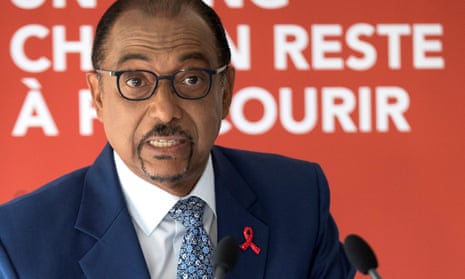The Swedish government has announced it is to withhold funding to a UN agency until its director resigns in a row over his “dysfunctional leadership”.
UNAids, which spearheads the global fight against Aids and HIV, will receive no further funding until its executive director, Michel Sidibé, stands down, said Isabella Lövin, Sweden’s minister for international development cooperation and climate.
The warning follows a scathing report that condemned a patriarchal culture within the organisation.
Britain has been attacked by campaigners for not taking a similarly strong stance. The UK’s Department for International Development (DfID), is also a key donor.
Sweden, UNAid’s second biggest donor after the US, contributed 260m Swedish krona (£22m) in 2017.
UNAids was thrown into an unprecedented crisis after an independent review released on Friday warned of “a patriarchal culture tolerating harassment and abuse of authority”.
Calling for a change of leadership, the report said Sidibé had set a tone of “favouritism, preferment, opaqueness, license for wrongdoing, and retaliation against those who speak up against such practices”.
The report, commissioned following multiple allegations of sexual harassment and bullying, is being discussed by the agency’s oversight body, the Programme Coordinating Board (PCB), this week.
During the session, which began on Tuesday, Sidibé announced that the next board meeting, in June 2019, would be his last, but did not specify when he plans to step down.
Richard Horton, editor-in-chief of the Lancet, wrote a comment article this week describing Sidibé’s response to the crisis as “surreal”. “Nowhere does he accept that he was responsible for the toxic work environment that his leadership created,” wrote Horton.
Lövin told the Swedish newspaper Svenska Dagbladet on Tuesday that the agency’s leadership was dysfunctional and said Sidibé should resign immediately.
“We have made clear on several occasions that we have no confidence in Sidibé. I have also said this to him in person,” she said. “We believe that he should step down now.”
Funding would be suspended until he did so, she added.
The Labour MP Gareth Thomas said the UK, the fifth largest donor, should take a tougher stance. An immediate change in leadership is needed, added Thomas, a former DfID minister.
“If Mr Sidibé is not prepared to recognise this then, without doubt, Britain should suspend our financial support until he goes,” he said.
“Establishing a new culture within the organisation won’t start properly with him still in post and, given the importance of UNAid’s role, this is urgent.”
The campaign group Code Blue, which seeks to end impunity for sexual abuse by UN personnel, said that the UK, as chair of the UNAids governing board, had “failed spectacularly” to solve the ongoing crisis at the agency.
“It is at the very least incumbent upon [the UK] to follow the recommendations of the independent expert panel and call for the secretary general to fire Michel Sidibé immediately,” said Paula Donovan, co-founder of Code Blue.
The meeting of the PCB, which is deeply divided over the future of Sidibé’s leadership, is expected to continue until Thursday evening.
DfID said in a statement that it expected “immediate and far-reaching action from UNAids” to address the concerns raised in last week’s report.
“The sector has been very clear that we cannot tolerate practices which don’t reach the standards we require,” the statement said.
